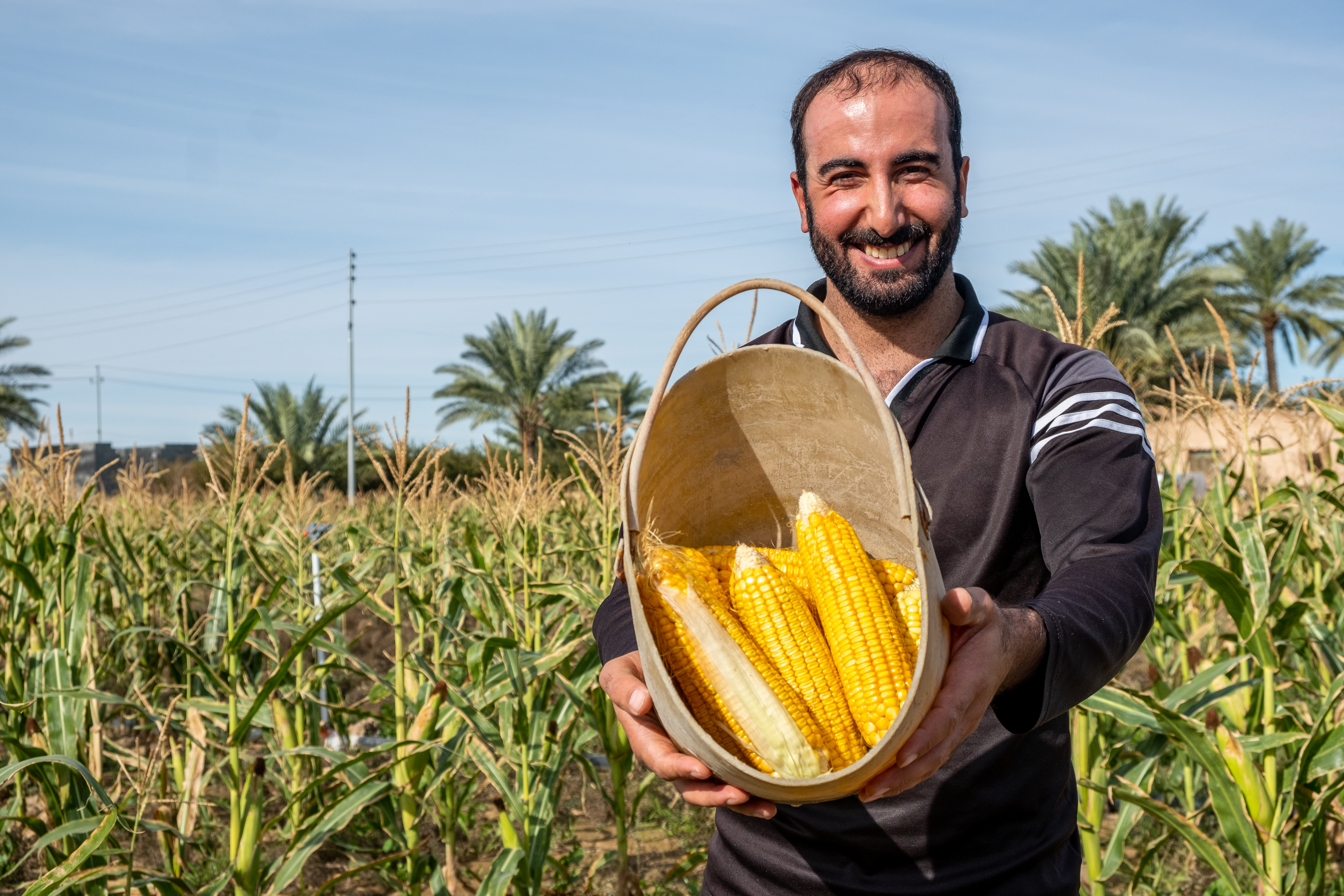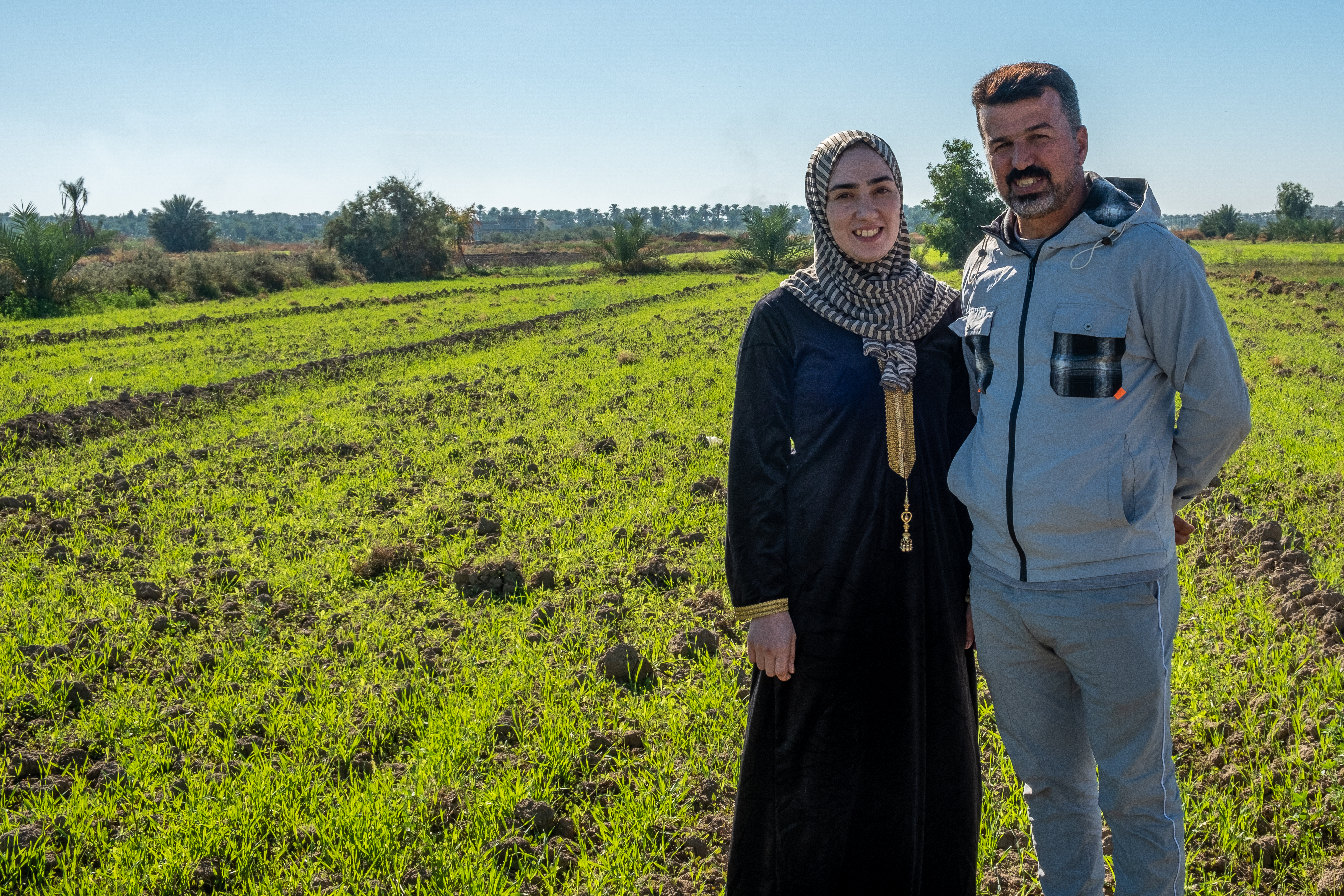By promoting sustainable agriculture, UNDP is empowering small farmers toward climate resilience
Cultivating resilience in Iraq’s farms
January 24, 2024

Majeed Abd is a prime example of Iraq's young farmers embracing sustainable practices.
From the sprawling plains of Mesopotamia to the rugged mountains of Kurdistan, Iraq’s arable lands have yielded an abundance of crops, sustaining communities for centuries and contributing to regional trade. Despite the challenges posed by conflict and climate change, farming remains a vital sector of Iraq’s economy, providing livelihoods for millions and ensuring the country's food security.
In Iraq, farming reflects the deep connection between the people and their land. For many families in rural Iraq, farming is passed down through generations. Children grow up alongside their parents and grandparents, who serve as custodians of the land, learning traditional techniques in cultivating the soil, harvesting crops, and preserving the environment.

In Al-Borkash neighborhood, Eeman Sami Gafel, 40, juggles her family responsibilities with her small backyard farm that provides them sustenance and extra income.
Farming for a healthier future
In Saqlawia subdistrict in Anbar governorate, where almost every family is engaged in farming, Eeman Sami Gafel starts her day early. Once her five children are off to school and her taxi driver husband is on the road, she heads straight to her vegetable garden where she spends hours cultivating the one-donum plot of land her family owns and nurturing rows of tomatoes, beans, cucumbers, and okra.
Eeman got her passion for agriculture from her parents, who instilled in her the importance of self-sufficiency and sustainable living. Through her backyard vegetable garden, Eeman is able to provide healthy and nutritious food and generate additional income for her family. Every year she earns at least 1.6 million Iraqi dinars (about US$ 1,200) from planting and selling vegetables.
“I’ve always believed in the power of farming,” Eeman says. “Through this small piece of land, I am able to harvest vegetables, cook nutritious meals for my children, ensure my family’s health and well-being, and earn some money to support our daily needs.”
Eeman also finds strength and joy in farming. "I started farming when I was young, helping my parents in the fields," Eeman recalls. "I learned from them hard work and perseverance, and I have instilled those values in my own children."
A young farmer with a big dream
Majeed Abd spent most of his childhood playing in the fields. It was also where he developed his love for plants, that eventually inspired him to pursue biology in college. Studying plants and animals further fueled his interest in crop science, leading him to take over his family’s 2.5 donum farm.
"I was fascinated with plants and the science behind their growth," the 25-year-old farmer explains. "When I studied biology, I realized that there were so many ways we could improve our farming practices to be more sustainable and environmentally friendly."
As the eldest child in a family of eleven, Majeed is eager to improve his family's main source of livelihood by blending traditional and modern farming techniques.
“I want to continue what my parents started and expand our farm to create a stable source of income for my family. I want to optimise our yields while reducing our environmental impact,” Majeed says.

The heart and soul of their family farm, Reyam and Wassim Farhana'akap share an unwavering commitment to their land and their parents’ legacy.
A family united in farming
Reyam Farhana'akap and her brother Wassim Farhana'akap, two passionate farmers, have dedicated their lives to cultivating their family's land. Together, they manage two acres of land inherited from their parents, where they have been planting wheat, barley, corn, and clover for more than two decades to sustain their family of ten.
“Our land is important for our family. For us, farming is not just a job. It is an integral part of our lives,” Reyam says.
“We have been farmers for many years, and it is our responsibility to continue this legacy for our children,” Wassim affirms.
They plant wheat every November and harvest by May, and corn from April to July. Every year their farm earns at least 5 million Iraqi dinars (about US$ 3,800).
Building resilience through sustainable agriculture
For many years, farmers like Eeman, Majeed, Reyam, and Wassim have relied on traditional farming and irrigation methods. Farmers typically take water from borehole pumps to irrigate their farms, a labor-intensive and water-consuming process that has become more difficult and costly as water levels have receded throughout Iraq.
"Our harvest depends on the availability of water. With droughts becoming more intense, we know we have to manage water more efficiently,” Wassim says.
To support farmers in Iraq adapt to climate change, the United Nations Development Programme (UNDP) is providing training programs and financial grants to enable them to adopt sustainable agriculture practices. Farmers learn about crop diversification, crop rotation, soil management, water conservation, drought-resistant techniques, value chain analysis, and business management, boosting farm productivity and securing their livelihoods for years to come.
“I’ve been farming most of my life, but it was only after attending the trainings that I learned about drip irrigation. This technique allows us to use less water while maintaining healthy crops,” Eeman shares.
"We are learning to be more than just farmers. We are becoming entrepreneurs, managing our farm as a business, and exploring new opportunities to increase our profits,” Reyam says.
In addition, Reyam, Eeman, and Majeed are receiving a 4-million Iraqi dinar (about US$ 3,000) grant from UNDP to support them in implementing these new technologies on their farms. While attending the trainings, all three also received an US$800 transportation stipend. Eeman saved most of her allowance and bought two goats while Majeed used the money to buy six sheep.
Inspired by the knowledge and skills he acquired, Majeed secured a 3 million Iraqi dinar loan right after the training to kickstart his farm’s transition to drip irrigation. Now, Majeed's cornfields are thriving, and he is expecting a bountiful harvest before this year ends.
He also observed a significant reduction in his water consumption. By using drip irrigation, he is saving more than half of his usual water usage. "Before, we would spend four to five hours every day just watering our crops, using up a lot of water. But with drip irrigation, we water directly to the roots of the plants, saving us time, resources, and effort."
About
Through UNDP’s Building Resilience through Employment Promotion (BREP) programme, generously funded by the German Federal Ministry of Economic Cooperation and Development (BMZ) provided through the KfW Development Bank, more than 1,000 small farmers across Iraq will be trained on sustainable agriculture practices and provided with grants to boost farm productivity and enhance agro-enterprises.
Reyam, Eeman, and Majeed are part of the project “Supporting a Resilient Economic Recovery by strengthening the Agriculture Sector in Saqlawia District, Anbar Governorate” under UNDP’s BREP programme which is being implemented with partner World Vision. Over 300 farmers in Saqlawia subdistrict benefitted from this project.

 Locations
Locations






